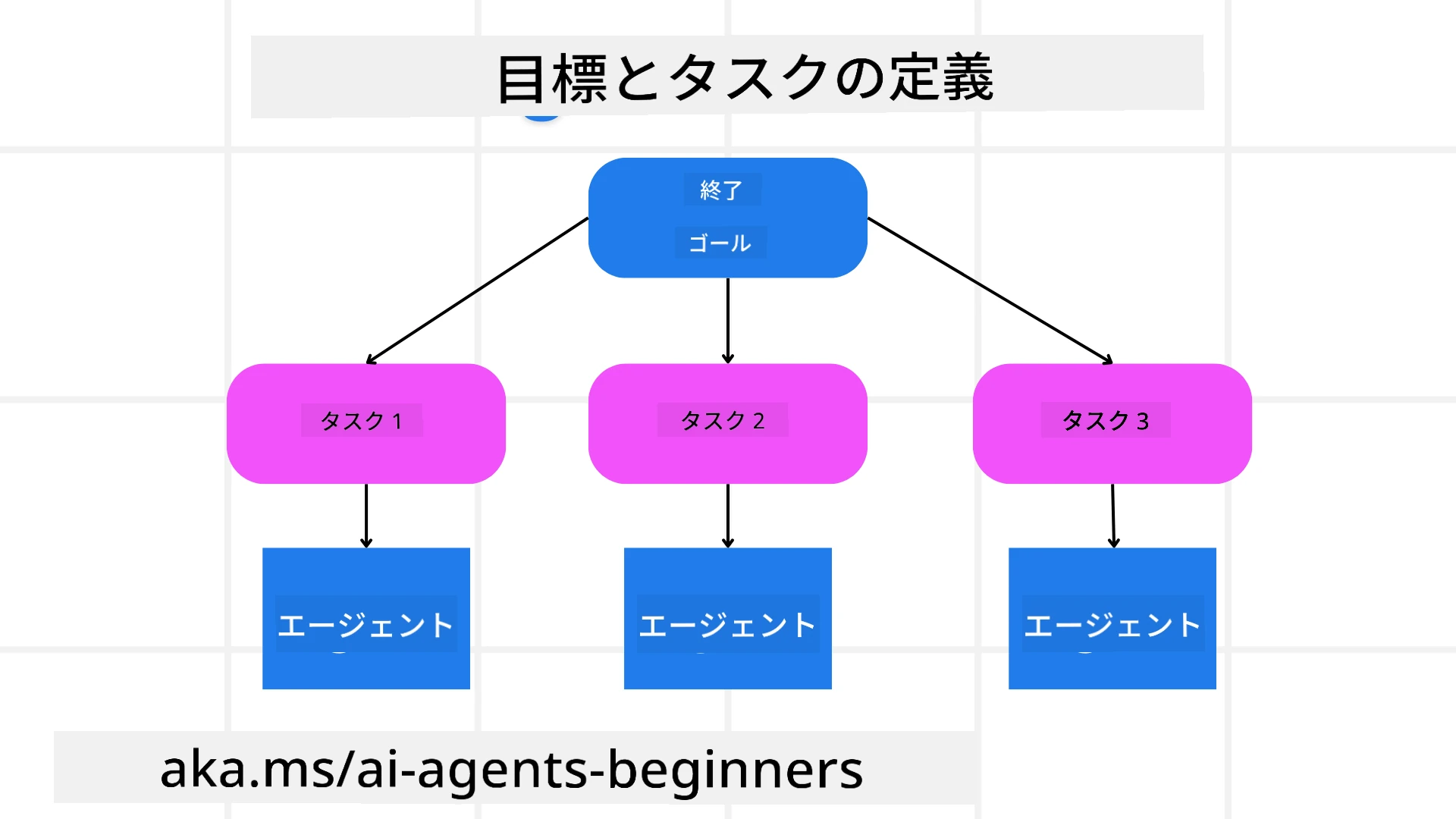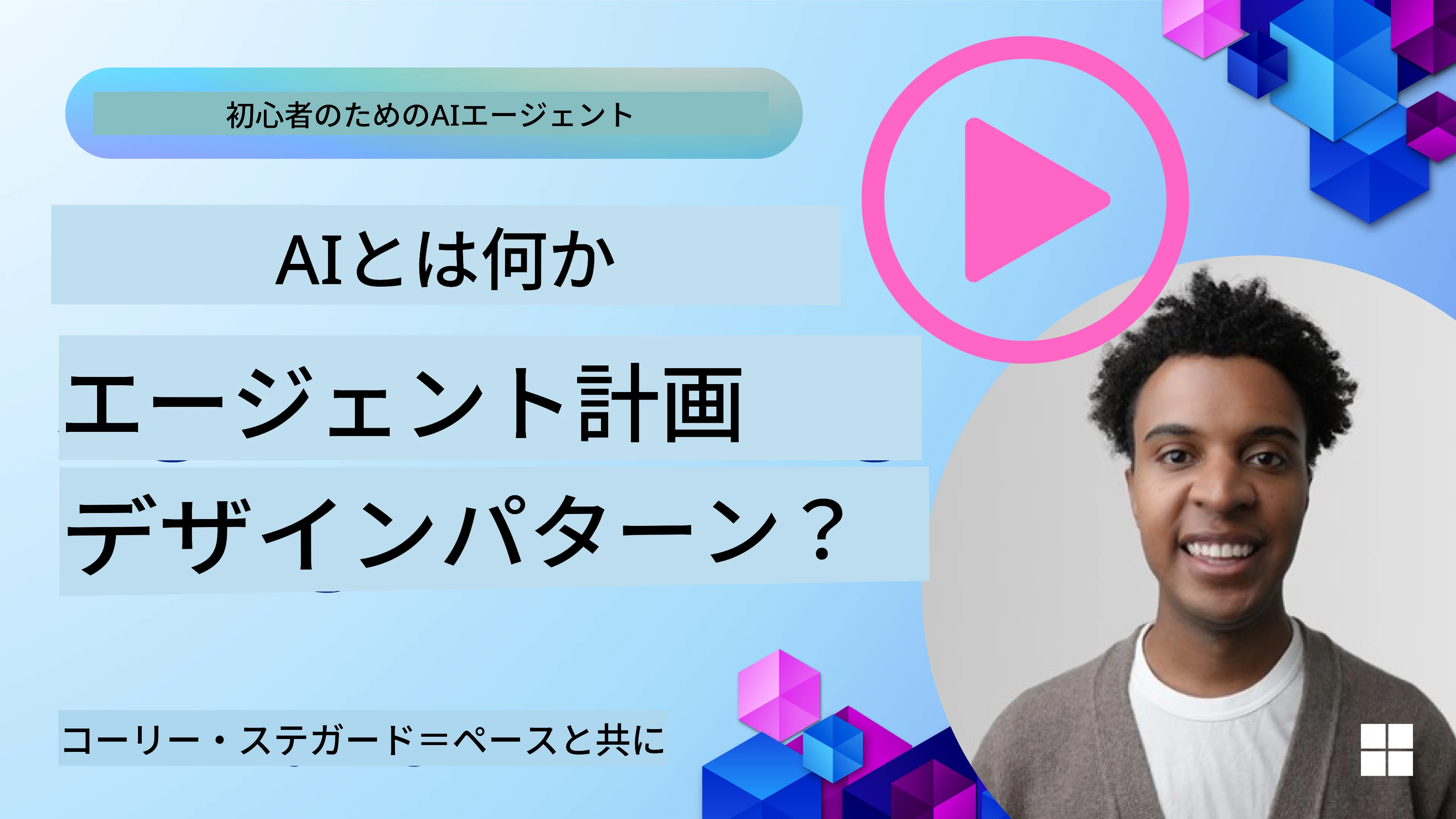ai-agents-for-beginners
(上の画像をクリックすると、このレッスンの動画が視聴できます)
計画設計
はじめに
このレッスンでは以下を学びます:
- 明確な全体目標を定義し、複雑なタスクを管理可能なタスクに分解する方法。
- 構造化された出力を活用して、より信頼性が高く機械で読み取り可能な応答を得る方法。
- イベント駆動型アプローチを適用して、動的なタスクや予期しない入力に対応する方法。
学習目標
このレッスンを完了すると、以下について理解が深まります:
- AIエージェントの全体目標を設定し、達成すべき内容を明確にする方法。
- 複雑なタスクを管理可能なサブタスクに分解し、それらを論理的な順序で整理する方法。
- エージェントに適切なツール(例:検索ツールやデータ分析ツール)を装備させ、それらをいつ、どのように使用するかを決定し、発生する予期しない状況に対応する方法。
- サブタスクの結果を評価し、パフォーマンスを測定し、最終的な出力を改善するために行動を繰り返す方法。
全体目標の定義とタスクの分解

ほとんどの現実世界のタスクは、1ステップで解決するには複雑すぎます。AIエージェントには、計画と行動を導くための簡潔な目的が必要です。例えば、以下の目標を考えてみましょう:
"3日間の旅行プランを作成する。"
これは簡単に述べられていますが、まだ精緻化が必要です。目標が明確であればあるほど、エージェント(および人間の協力者)は、フライトオプション、ホテルのおすすめ、アクティビティの提案を含む包括的な旅程を作成するなど、適切な結果を達成することに集中できます。
タスクの分解
大規模または複雑なタスクは、小さく目標指向のサブタスクに分割することで管理しやすくなります。 旅行プランの例では、目標を以下のように分解できます:
- フライト予約
- ホテル予約
- 車のレンタル
- パーソナライズ
各サブタスクは、専用のエージェントやプロセスによって処理されます。例えば、あるエージェントは最適なフライトの検索に特化し、別のエージェントはホテル予約に集中します。そして、調整役または「下流」のエージェントがこれらの結果をまとめて、最終的な旅程をユーザーに提供します。
このモジュール型アプローチは、段階的な改善も可能にします。例えば、食事のおすすめや地元のアクティビティの提案に特化したエージェントを追加し、旅程を時間をかけて洗練させることができます。
構造化された出力
大規模言語モデル(LLM)は、下流のエージェントやサービスが解析・処理しやすい構造化された出力(例:JSON)を生成できます。これは特にマルチエージェント環境で有用であり、計画の出力を受け取った後にこれらのタスクを実行できます。簡単な概要は以下の通りです。
以下のPythonコードスニペットは、目標をサブタスクに分解し、構造化された計画を生成するシンプルな計画エージェントを示しています:
from pydantic import BaseModel
from enum import Enum
from typing import List, Optional, Union
import json
import os
from typing import Optional
from pprint import pprint
from autogen_core.models import UserMessage, SystemMessage, AssistantMessage
from autogen_ext.models.azure import AzureAIChatCompletionClient
from azure.core.credentials import AzureKeyCredential
class AgentEnum(str, Enum):
FlightBooking = "flight_booking"
HotelBooking = "hotel_booking"
CarRental = "car_rental"
ActivitiesBooking = "activities_booking"
DestinationInfo = "destination_info"
DefaultAgent = "default_agent"
GroupChatManager = "group_chat_manager"
# Travel SubTask Model
class TravelSubTask(BaseModel):
task_details: str
assigned_agent: AgentEnum # we want to assign the task to the agent
class TravelPlan(BaseModel):
main_task: str
subtasks: List[TravelSubTask]
is_greeting: bool
client = AzureAIChatCompletionClient(
model="gpt-4o-mini",
endpoint="https://models.inference.ai.azure.com",
# To authenticate with the model you will need to generate a personal access token (PAT) in your GitHub settings.
# Create your PAT token by following instructions here: https://docs.github.com/en/authentication/keeping-your-account-and-data-secure/managing-your-personal-access-tokens
credential=AzureKeyCredential(os.environ["GITHUB_TOKEN"]),
model_info={
"json_output": False,
"function_calling": True,
"vision": True,
"family": "unknown",
},
)
# Define the user message
messages = [
SystemMessage(content="""You are an planner agent.
Your job is to decide which agents to run based on the user's request.
Provide your response in JSON format with the following structure:
{'main_task': 'Plan a family trip from Singapore to Melbourne.',
'subtasks': [{'assigned_agent': 'flight_booking',
'task_details': 'Book round-trip flights from Singapore to '
'Melbourne.'}
Below are the available agents specialised in different tasks:
- FlightBooking: For booking flights and providing flight information
- HotelBooking: For booking hotels and providing hotel information
- CarRental: For booking cars and providing car rental information
- ActivitiesBooking: For booking activities and providing activity information
- DestinationInfo: For providing information about destinations
- DefaultAgent: For handling general requests""", source="system"),
UserMessage(
content="Create a travel plan for a family of 2 kids from Singapore to Melboune", source="user"),
]
response = await client.create(messages=messages, extra_create_args={"response_format": 'json_object'})
response_content: Optional[str] = response.content if isinstance(
response.content, str) else None
if response_content is None:
raise ValueError("Response content is not a valid JSON string" )
pprint(json.loads(response_content))
# # Ensure the response content is a valid JSON string before loading it
# response_content: Optional[str] = response.content if isinstance(
# response.content, str) else None
# if response_content is None:
# raise ValueError("Response content is not a valid JSON string")
# # Print the response content after loading it as JSON
# pprint(json.loads(response_content))
# Validate the response content with the MathReasoning model
# TravelPlan.model_validate(json.loads(response_content))
マルチエージェントオーケストレーションを備えた計画エージェント
この例では、Semantic Router Agentがユーザーのリクエスト(例:「旅行のためのホテルプランが必要です」)を受け取ります。
プランナーは以下を行います:
- ホテルプランの受信:プランナーはユーザーのメッセージを受け取り、システムプロンプト(利用可能なエージェントの詳細を含む)に基づいて構造化された旅行プランを生成します。
- エージェントとそのツールのリスト化:エージェントレジストリには、フライト、ホテル、車のレンタル、アクティビティなどのエージェントのリストと、それらが提供する機能やツールが含まれています。
- プランを該当するエージェントにルーティング:サブタスクの数に応じて、プランナーはメッセージを専用エージェントに直接送信(単一タスクの場合)するか、マルチエージェントコラボレーションのためにグループチャットマネージャーを介して調整します。
- 結果の要約:最後に、プランナーは生成されたプランを明確に要約します。
以下のPythonコードサンプルはこれらのステップを示しています:
from pydantic import BaseModel
from enum import Enum
from typing import List, Optional, Union
class AgentEnum(str, Enum):
FlightBooking = "flight_booking"
HotelBooking = "hotel_booking"
CarRental = "car_rental"
ActivitiesBooking = "activities_booking"
DestinationInfo = "destination_info"
DefaultAgent = "default_agent"
GroupChatManager = "group_chat_manager"
# Travel SubTask Model
class TravelSubTask(BaseModel):
task_details: str
assigned_agent: AgentEnum # we want to assign the task to the agent
class TravelPlan(BaseModel):
main_task: str
subtasks: List[TravelSubTask]
is_greeting: bool
import json
import os
from typing import Optional
from autogen_core.models import UserMessage, SystemMessage, AssistantMessage
from autogen_ext.models.openai import AzureOpenAIChatCompletionClient
# Create the client with type-checked environment variables
client = AzureOpenAIChatCompletionClient(
azure_deployment=os.getenv("AZURE_OPENAI_DEPLOYMENT_NAME"),
model=os.getenv("AZURE_OPENAI_DEPLOYMENT_NAME"),
api_version=os.getenv("AZURE_OPENAI_API_VERSION"),
azure_endpoint=os.getenv("AZURE_OPENAI_ENDPOINT"),
api_key=os.getenv("AZURE_OPENAI_API_KEY"),
)
from pprint import pprint
# Define the user message
messages = [
SystemMessage(content="""You are an planner agent.
Your job is to decide which agents to run based on the user's request.
Below are the available agents specialized in different tasks:
- FlightBooking: For booking flights and providing flight information
- HotelBooking: For booking hotels and providing hotel information
- CarRental: For booking cars and providing car rental information
- ActivitiesBooking: For booking activities and providing activity information
- DestinationInfo: For providing information about destinations
- DefaultAgent: For handling general requests""", source="system"),
UserMessage(content="Create a travel plan for a family of 2 kids from Singapore to Melbourne", source="user"),
]
response = await client.create(messages=messages, extra_create_args={"response_format": TravelPlan})
# Ensure the response content is a valid JSON string before loading it
response_content: Optional[str] = response.content if isinstance(response.content, str) else None
if response_content is None:
raise ValueError("Response content is not a valid JSON string")
# Print the response content after loading it as JSON
pprint(json.loads(response_content))
前述のコードからの出力例を以下に示します。この構造化された出力を使用してassigned_agentにルーティングし、旅行プランをエンドユーザーに要約することができます。
{
"is_greeting": "False",
"main_task": "Plan a family trip from Singapore to Melbourne.",
"subtasks": [
{
"assigned_agent": "flight_booking",
"task_details": "Book round-trip flights from Singapore to Melbourne."
},
{
"assigned_agent": "hotel_booking",
"task_details": "Find family-friendly hotels in Melbourne."
},
{
"assigned_agent": "car_rental",
"task_details": "Arrange a car rental suitable for a family of four in Melbourne."
},
{
"assigned_agent": "activities_booking",
"task_details": "List family-friendly activities in Melbourne."
},
{
"assigned_agent": "destination_info",
"task_details": "Provide information about Melbourne as a travel destination."
}
]
}
前述のコードサンプルを含むサンプルノートブックはこちらで利用可能です。
繰り返し計画
一部のタスクでは、結果が次のサブタスクに影響を与えるため、再計画ややり取りが必要です。例えば、エージェントがフライト予約中に予期しないデータ形式を発見した場合、ホテル予約に進む前に戦略を適応させる必要があるかもしれません。
さらに、ユーザーのフィードバック(例:ユーザーが早い時間のフライトを希望する場合)が部分的な再計画を引き起こすことがあります。この動的で反復的なアプローチにより、最終的な解決策が現実世界の制約や進化するユーザーの好みに合致することを保証します。
例:サンプルコード
from autogen_core.models import UserMessage, SystemMessage, AssistantMessage
#.. same as previous code and pass on the user history, current plan
messages = [
SystemMessage(content="""You are a planner agent to optimize the
Your job is to decide which agents to run based on the user's request.
Below are the available agents specialized in different tasks:
- FlightBooking: For booking flights and providing flight information
- HotelBooking: For booking hotels and providing hotel information
- CarRental: For booking cars and providing car rental information
- ActivitiesBooking: For booking activities and providing activity information
- DestinationInfo: For providing information about destinations
- DefaultAgent: For handling general requests""", source="system"),
UserMessage(content="Create a travel plan for a family of 2 kids from Singapore to Melbourne", source="user"),
AssistantMessage(content=f"Previous travel plan - {TravelPlan}", source="assistant")
]
# .. re-plan and send the tasks to respective agents
より包括的な計画については、Magnetic Oneをご覧ください。複雑なタスクを解決するための包括的なアプローチを提供します。
まとめ
この記事では、利用可能なエージェントを動的に選択するプランナーを作成する方法の例を見てきました。プランナーの出力はタスクを分解し、エージェントに割り当てて実行できるようにします。エージェントがタスクを実行するために必要な機能やツールにアクセスできることが前提です。エージェントに加えて、リフレクション、要約、ラウンドロビンチャットなどのパターンを追加してさらにカスタマイズすることも可能です。
追加リソース
AutoGen Magnetic One - 複雑なタスクを解決するための汎用マルチエージェントシステムで、複数の難しいエージェントベンチマークで優れた結果を達成しています。参考:
この実装では、オーケストレーターがタスク固有の計画を作成し、これらのタスクを利用可能なエージェントに委任します。オーケストレーターは計画だけでなく、タスクの進捗を監視し、必要に応じて再計画を行う追跡メカニズムも採用しています。
計画設計パターンについてさらに質問がありますか?
Azure AI Foundry Discordに参加して、他の学習者と交流したり、オフィスアワーに参加したり、AIエージェントに関する質問に答えてもらいましょう。
前のレッスン
次のレッスン
免責事項:
この文書は、AI翻訳サービス Co-op Translator を使用して翻訳されています。正確性を追求しておりますが、自動翻訳には誤りや不正確な部分が含まれる可能性があります。元の言語で記載された文書が正式な情報源とみなされるべきです。重要な情報については、専門の人間による翻訳を推奨します。この翻訳の使用に起因する誤解や誤解釈について、当社は責任を負いません。
